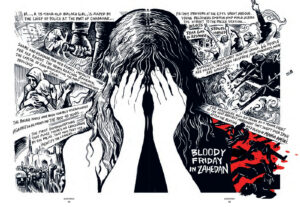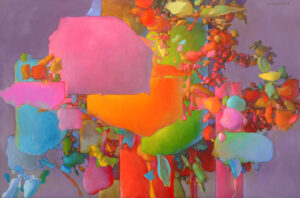An exhibit on Abdul Wahab el-Inglizi Street in Beirut, at Takeover, asks viewers to consider the motif of the evil eye — a primordial symbol used to ward off malevolent forces through a shielding gaze. Deeply embedded in the folklore and collective psyche of the Mediterranean region and beyond, this symbol is reimagined as both a safeguarding and destabilizing force. Next, Ramzi Mallat’s work in Constellations of Protection will be on display at the VIMA Art Fair in Cyprus/Limassol from 16-18 of May 2025.
Ramzi Mallat has described Suspended Disbelief as an exercise whereby one embraces the uncertainty of first encounters. At Takeover, the artist-run space dedicated to emerging and contemporary art in Beirut, viewers are not only asked to set aside their skepticism, but also to embrace ambiguity. The exhibition carries echoes of the destruction in Lebanon since October 2023 and that of recent months and days. The interaction is not limited to the objects on view at the exhibition space. Suspended Disbelief also asks us to suspend belief in the political realities that affect how people are living in Lebanon and the Levant.
Inside Takeover, the ac had been switched on and I felt cold. Outside it was warm. Delicate bronze statues were held by oversized and aggressive metal hooks. After one hour, details became less pronounced. The eye wallpaper had twirled viewers like the spinning background used in movies from the 1960s and put them in a trance-like mood. Differences became less asymmetric and a sense of conversation filled the exhibition space: between different tenses, across countries in the region, between locations-in-dialogue in Lebanon.
The transformative impact of war, societal breakdown, and crisis on artistic expression is certain. Artists often use their practice to investigate specific themes. Others use it as a medium to express deeply personal responses. Regardless of the response, artists are inevitably influenced by their environment. In Lebanon, particularly over the past six years, the art scene has been in a continuous state of upheaval, constantly processing and reacting to challenges while also finding new ways to express resistance.
Mallat’s studio in Merdache is not far away from the area in Beirut where just the day before, an Israeli airstrike destroyed an entire residential building. Nothing feels distant enough in Lebanon, neither its present nor its past. Mallat spends a good portion of his time between the UK and Lebanon. However, he was in Beirut for some weeks in March and April when I visited him in his studio. I was unaware that many of the events that informed his artistic practice were the same ones that I experienced in Lebanon. Our conversation became a tree canopy with branches and stems covering a vast range of topics, including episodes that influenced Mallat’s trajectory as an artist; the inaugural sense of promise of the 2019 revolution and the artist’s response; the legend of Icarus and the story of Lebanon; the inability to speak and the role that words can have and cease to have in Lebanon and Gaza.

Marta Mendes: I read the curatorial brief prepared for Suspended Disbelief. It speaks about not only suspending disbelief in a narrative sense but asking viewers to let go and “embrace the uncertainty of the encounter.” Why suspended? Why should this not be a more permanent stance, one that will help us deal with the state of things in Lebanon?
Ramzi Mallat: I think “suspended” as an umbrella term hints at what I’m looking to engage viewers with — an illusion, a trickery, but also a complete immersion into the artwork. I always thought of it this way and one reference I always go back to is Umberto Eco’s The Open Work — this ability to constantly question and rebuild the meaning of an object you’re looking at. I also think it ties to the fact that it is specific to the sociopolitical climate in Lebanon having to suspend one’s disbelief in such a manner as to engage with the arts in an unstable period of the country’s history.
I did ponder to myself if it was fitting to actually exhibit in Lebanon at this time, because of the different stressors and the uncertainty, but I got over myself for that because I know that this sector also needs to thrive regardless. It’s not just an escape, but a necessity for both myself and our society to flourish. And going back to the exhibition at Takeover, I really believe it was intended to be a disruption through and through. Even as you pass by the street, the installation forces you in some primal way to look at it, and engage with it. This suspension isn’t in the space but rather within the viewer to engage with the work, to be uneasy, trying to make sense of this sensory overload that the wallpaper I created induces. And the longer the exposure, the more this imagery ends up embedding itself into the retinas of the viewers so that when their eyes are closed there is still a residue of this agitation.
TMR: Wouldn’t that prepare us better to deal with “the dangerous new normal” that we witness in Lebanon and in the region? The Israeli airstrikes in Beirut yesterday felt like an “augury” — borrowing from the theme of superstition in your exhibition — of much more recurring violence in Lebanon and in the region.
RM: Suspension is suspense too. We’re always caught off guard and exist in this state of anxious waiting. And because we’re unsure and uneasy, we’re unable to project long-term. I think that suspension isn’t just an escape but also a grace, like a small garden where you can sit to unwind and decompress from all the different burdens that daily life in this region brings.
After having experienced such traumatizing events in the country during the past five years, perhaps even the first traumas for our young generations that have been deeply felt consecutively, you need respite after that shock to just unpack the events.
On the other hand, we also like to live in our own bubbles in Lebanese society. So what is seen as deceit at face value is actually a survival mechanism in its own right. And I personally don’t think of it as something to be addressed or reprimanded but understood as the basis of all truths: inherent myths we create to uphold ideologies. So there is a constant blurring of the lines between fact and fiction, especially in Lebanon, where disinformation is caused by the lack of actually solidified national history. And there’s strength in upholding that deception simply to be able to move forward as a society, because tomorrow isn’t promised.
TMR: Your suspended bronze works were inspired, you said, by ancient artifacts found in the “Eye complex” in Syria and more precisely in Tell Brak. It is difficult to use the word “inspiration” when it comes to Gaza, given the unprecedented destruction and suffering. What kind of “suspension” would Gaza invite us into?
RM: Regarding Tell Brak, it was important in naming it as such because it is an archeological site, one I would like to visit at some point. What’s also important for me about that place is the fact that it is in a desert and was spared the multicultural influences we see in well-known trade routes. When I started researching the site, it was really sad to see that the space was completely pillaged and that archeologists weren’t able to conduct proper research in that location and unearth the rich history that could have been discovered. Yet, when I first saw these objects, I was visiting the Nabu museum in Chekka, and I was pulled in by that vacuous gaze. I believe they resonated with an emptiness I have been dealing with throughout my upbringing, emptiness of knowledge, emptiness of references, and emptiness of identity because of my education in Lebanon. That emptiness was translated into that encounter, and then I obsessively researched to understand the origin and meaning of these artifacts and was met with a secondary emptiness. So this whole expedition was about filling a void, metaphorically and physically, as even the molding and casting process to produce these works deals with positive and negative space that must be filled.
I was experiencing that loss of heritage over and over again just by making this series. Most of my photographic references to produce the sculptures came from auction houses where these works were being traded, so there was a commercial value directly placed on these works. I wanted to play with that value system by accentuating the commodification of heritage through the use of meat hooks, a violent and haphazard method of display. When I first exhibited these works in this manner in London, we were still at war with Israel, and during that exhibition, we not only saw the brokering of a ceasefire but also the fall of the Assad regime. When all the videos of torture, suffering, and the industrialized killing machinery of prison complexes surfaced, there was a completely new reading to these hooks; one that highlighted this anguish and the failings of these votive offerings in protecting the same civilizations that created them. The unprecedented violence in Gaza also speaks to the failings of the protective gaze of both the evil eye and the international community that is watching a genocide unfold from the comfort of their own homes. So, I think that my work deals with an overarching understanding of uncertainty, destruction, and loss through cultural heritage. And “suspension” becomes an ability to conceive of an alternative to the reality that burdens the region by deeply embracing its complexities.
TMR: In Suspended Disbelief, you invite the viewers to re-imagine the “evil eye” as a “safeguarding and destabilizing force.” This is part of a broader exercise of investigating history, memory, and identity. Symbols and their meanings change over time. There is a similar rationale informing the “evil eye” wallpaper. How relevant is this exercise today? Is preserving cultural memory an adequate response to the “appetite for destruction” we witness every day in Lebanon, in Gaza, Syria, Iraq, Yemen?
RM: It’s crucial for me to engage with what persists throughout time by questioning its relevance and understanding the mechanisms that perpetuate this persistence. When it comes to preserving cultural memory, however, I prefer to challenge these conventions by breathing new life into the ancient and traditional by adopting intuitive methodologies that come naturally to my practice. I’m not in the field of preservation for a reason. I believe that the static becomes a death of its own and instead I prefer to reinterpret and push the boundaries of what can be. I do, however, admire the efforts of preserving cultural heritage as it is an essential facet of being able to engage with the ancient. In the region, this seems to be a challenging, if not even Sisyphean, task to take up, but an altogether crucial one when witnessing so much destruction. But this also ties in with the larger issue of war, instability, and climate change. How can one preserve anything when everything is at stake?
TMR: What kind of trajectories is the destruction opening up in regard to how we approach memory?
RM: I think it’s important here to delineate the difference between destruction and erasure. Destruction does come with a possibility of rebuilding, whereas erasure comes with a preconceived idea to replace what was. Throughout my childhood in Lebanon, I have seen more cranes in Beirut than buildings. The country is in a constant state of reconstruction. I didn’t understand it back then, but the city is like a geological rock record, having been destroyed and rebuilt more than seven times, according to Lebanese folklore. There are so many archeological sites underneath our feet that can attest to that. I’m reminded here of Etel Adnan’s quote in The Arab Apocalypse: “Beirut is a corpse presented on a silver platter.”
It seems impossible to fathom that since Adnan wrote this book in 1980, not much has changed. I personally always describe the country as an open wound on which we continue to put a band-aid over time and again. The wound continues to grow, gets infected and puss oozes out, but we just replace the band-aid without properly dealing with the problem. The reconstruction of Beirut after the civil war speaks to that. Think of B018, the nightclub which was built on the same land of a brutal massacre in the Karantina which killed over 1,500 people. As you party in that club, you’re basically dancing on the mass graves of these murdered people. But at the same time, that wound is an entry point into the country’s internal subconscious, one which also allows for those ghosts to escape from and even dance with us. So, in a sense, memory is recalled by the haunting, contradicting realities we face on a daily basis. But memory is also buried sometimes for the sake of “keeping the peace” in such a sectarian country.
TMR: Lebanon was important “ground” for Palestinian resistance — after 1948 — to articulate itself, and to gain shape, form, and content. Resistance was not limited to Palestinians — many Lebanese were part of this resistance. Looking at the events that have unfolded in Gaza and Lebanon since October 7, 2023, what is the relationship you find today between art and resistance in Lebanon? What ought the role of the artist be?
RM: I don’t believe that my generation has contempt for the Palestinians the same way older generations in the country do. I think we are united as a front to want a “Free Palestine.” In that sense, this phrase has become a metaphorical phrase with larger implications associated with freeing the world from the last vestiges of colonization. I agree and disagree with that because I still see dehumanization all around the world, and I believe that it is associated with the larger issue of caste systems, of deeming some communities more inferior than others. It’s a sad reality that we have to witness a certain threshold of injustice for a cause to gain popularity. But at the same time, the hypocrisy of the west is being unraveled at an unprecedented rate, and it is putting democracy back in question as the preferred world order. After all, the 1948 Universal Declaration of Human Rights established a standard for all nations to uphold. It is now only used to demonize a select few and exonerate others who should be held accountable. I always think back to Rudyard Kipling’s “The White Man’s Burden” in such instances, where the imperialist powers are burdened with the task of “civilizing” the “barbarous” parts of the world. It seems to me that the barbarians are instead those pointing the finger of blame. So too does resistance become terrorism, self-determination a transgression of human rights, and occupation a legally enforced form of governance.
But in regards to art, I know it doesn’t seek to preoccupy itself in solving the world’s problems, although it can echo society’s shortcomings as it is circumscribed to the times from which it originates. So, I think it is through that visibility that art can forge a relationship with resistance, by bearing witness and disseminating information and emotion through the nuances of perspectives. Whereas for the artist, I believe their role should be to live, engage, and produce in whatever ways they see fit without the constraints of societal norms, values, or preconceived notions. An artist chooses to be useless and proves to be invaluable.








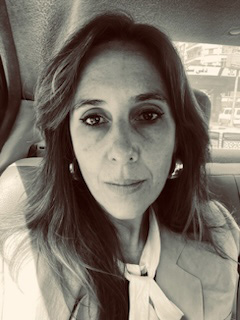












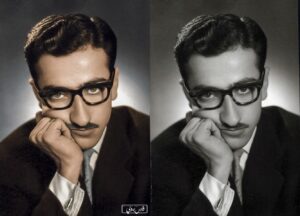



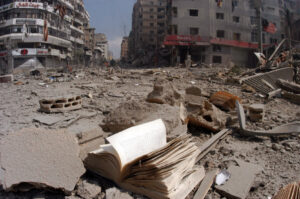






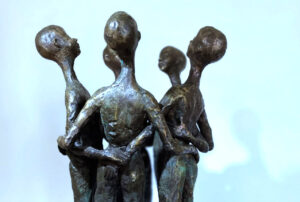




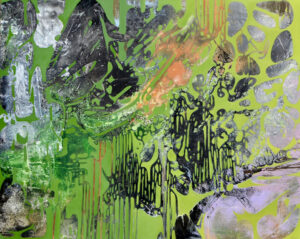



![Ali Cherri’s show at Marseille’s [mac] Is Watching You](https://themarkaz.org/wp-content/uploads/2025/09/Ali-Cherri-22Les-Veilleurs22-at-the-mac-Musee-dart-contemporain-de-Marseille-photo-Gregoire-Edouard-Ville-de-Marseille-300x200.jpg)
































































